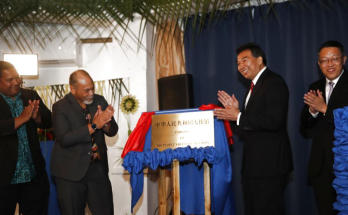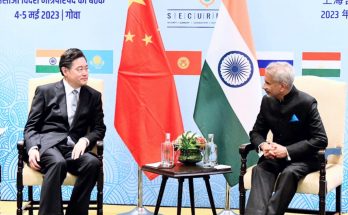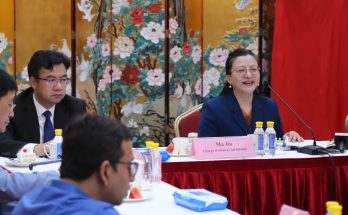NEW DELHI: As a new leadership takes charge in Beijing in March, India and China are trying hard to keep the warmth flowing in their relations as the Chinese plan to build three dams on the Brahamputra river is threatening to muddy the waters.
Much to the disquiet of India, the powerful State Council in China is said to have quietly approved the construction of three major dams on the cross-border river. Contrary to the long-held understanding, India was not informed about it. This has fuelled doubts in New Delhi about Beijing’s intentions.
 “As a lower riparian state with considerable established user rights to the waters of the river, India has conveyed its views and concerns to the Chinese authorities, including at the highest levels of the government of the People’s Republic of China,” Syed Akbaruddin, the spokesperson of India’s external affairs ministry, said in the Indian capital.
“As a lower riparian state with considerable established user rights to the waters of the river, India has conveyed its views and concerns to the Chinese authorities, including at the highest levels of the government of the People’s Republic of China,” Syed Akbaruddin, the spokesperson of India’s external affairs ministry, said in the Indian capital.
“India urges China to ensure that the interests of downstream states are not harmed by any activities in upstream areas,” he stressed.
According to reports emanating from Beijing, China is planning to build three dams at Dagu, Jiacha and Jiexu on Brahmaputra. In Beijing, Chinese Foreign Ministry spokesman Hong Lei sought to downplay a potentially thorny issue in bilateral ties with India. “China has always taken a responsible attitude towards the development of cross border rivers. Any new project has to go through scientific planning and study with consideration of the interests of lower and upper stream countries,” he said. The politically correct explanation has not convinced New Delhi which has been scrupulously monitoring China’s moves on the Brahmaputra river.
Known as Yarlung Zangbo in China, the Brahmaputra river has from time to time cropped up as a source of potential tensions with intermittent reports about China’s secret plans to divert waters of this mighty river. Issues related to the sharing of river waters have figured often in official discussions between India and China, with Beijing repeatedly assuring that it will not do anything to the detriment of lower riparian countries. The assurance was reiterated when National Security Adviser Shivshankar Menon met China’s influential State Councillor Dai Bingguo met on the sidelines of a meeting of senior national security officials of the BRICS countries in New Delhi Jan 10.
This minor irritant in bilateral ties has surfaced at a time when the new leadership in Beijing has struck upbeat notes about the trajectory of India-China relations over the next decade. Taking a long-range view of their relationship, the two rising Asian powers have made incremental efforts to keep their bilateral ties on an even keel. Despite a decades-old boundary dispute and several contentious issues that feed orchestration of India and China as rivals, the two countries have shown rare political will to deepen their strategic and economic ties. China has emerged as India’s largest trading partner, with bilateral trade growing by the day. Currently, bilateral trade is estimated to be $78 billion and both countries are confident of surpassing $100 billion target much before 2015.
Author Profile
- India Writes Network (www.indiawrites.org) is an emerging think tank and a media-publishing company focused on international affairs & the India Story. Centre for Global India Insights is the research arm of India Writes Network. To subscribe to India and the World, write to editor@indiawrites.org. A venture of TGII Media Private Limited, a leading media, publishing and consultancy company, IWN has carved a niche for balanced and exhaustive reporting and analysis of international affairs. Eminent personalities, politicians, diplomats, authors, strategy gurus and news-makers have contributed to India Writes Network, as also “India and the World,” a magazine focused on global affairs.
Latest entries
 DiplomacyApril 10, 2024Diplomat-author Lakshmi Puri pitches for women power at LSR
DiplomacyApril 10, 2024Diplomat-author Lakshmi Puri pitches for women power at LSR India and the WorldApril 6, 2024UN envoy pitches to take India’s solutions to the world stage
India and the WorldApril 6, 2024UN envoy pitches to take India’s solutions to the world stage CultureApril 5, 2024Youth in Diplomacy: Making it Matter with LSR Model UN 2024
CultureApril 5, 2024Youth in Diplomacy: Making it Matter with LSR Model UN 2024 India and the WorldMarch 28, 2024India to China: Normalization of troops deployment imperative for restoring ties
India and the WorldMarch 28, 2024India to China: Normalization of troops deployment imperative for restoring ties







